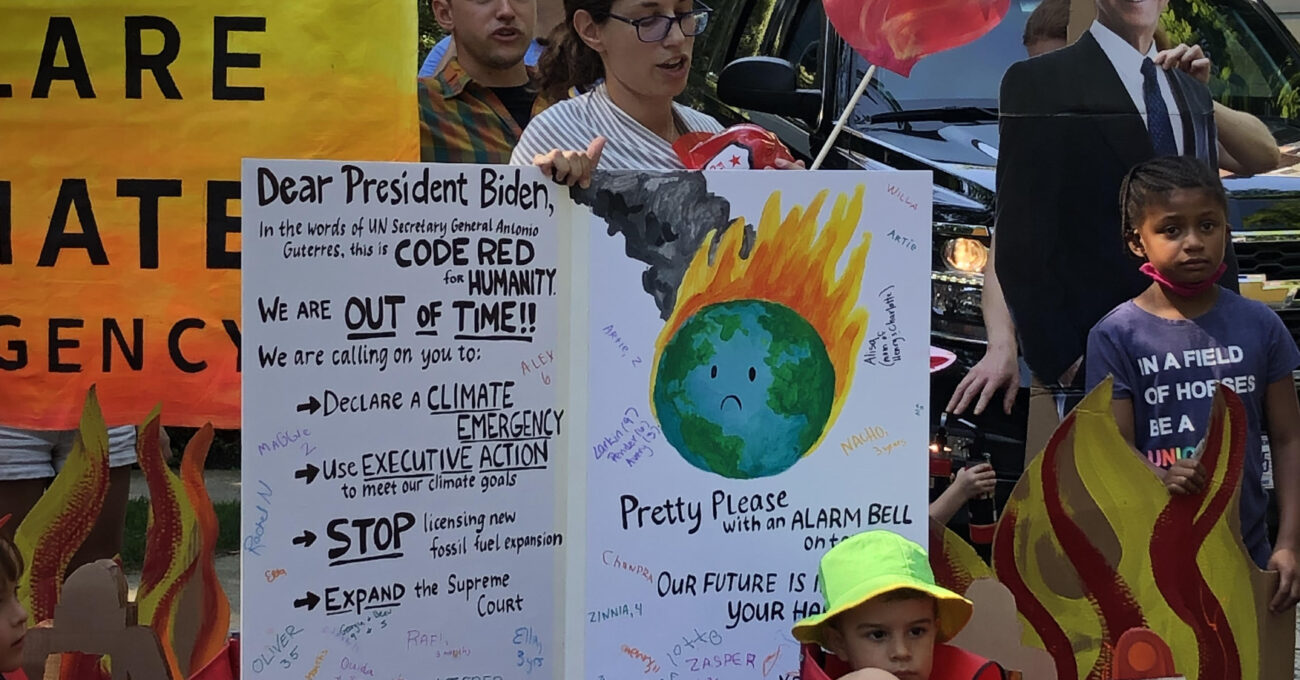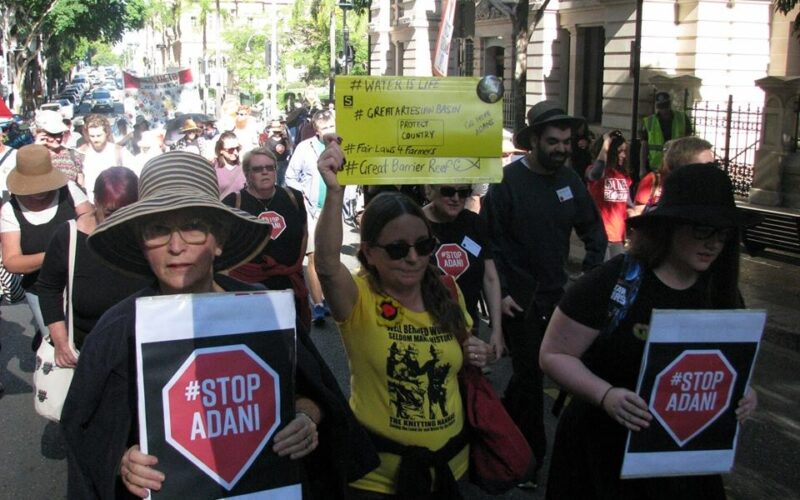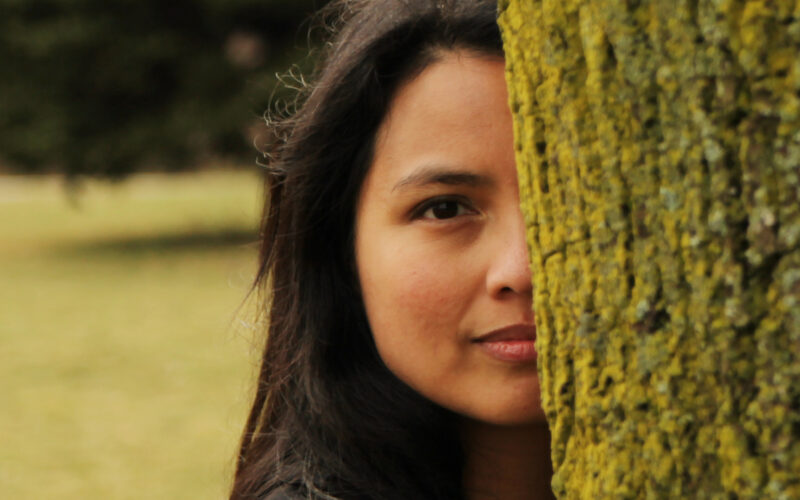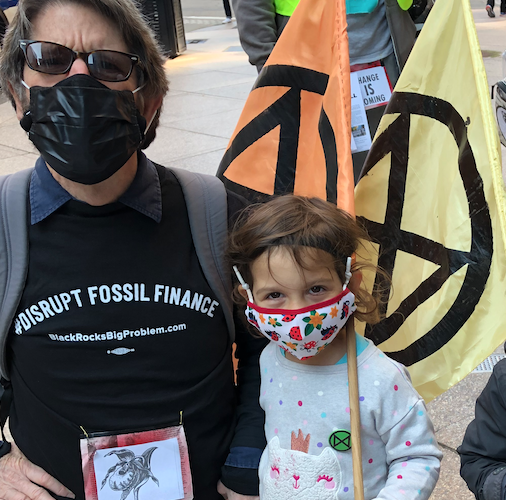
Getting Started
I became a teacher because of climate change. I wanted to help kids connect with the natural world–and through that with each other– in the hopes that they would grow up to be environmental stewards and empathetic citizens.
When Hurricane Sandy hit New York City while I was teaching first grade at an environmentally focused school in Brooklyn. Our building was shuttered for a full week. There was no remote school back then, so I spent my time off volunteering to clean up after the storm. I went to Red Hook, a coastal neighborhood in Brooklyn, where people were pumping raw sewage out of their homes and storefronts days after the storm. I think this was the beginning of realizing that teaching– while essential– was too slow of a method to combat the climate crisis. I went to my first climate march soon after in Washington D.C. against the Keystone Pipeline.
Alarm Bells
2016 turned me from protester to organizer. With Trump in the White House and New York’s local government mired in dysfunction, it was clear no one was coming to save us and we’d have to buckle up and save ourselves. While teaching science to elementary schoolers, I co-founded an Indivisible group and embarked on a rapid crash course in civics and activism. I knocked thousands of doors, organized phonebanks, protests and canvasses, and started writing op-eds for local news outlets. Then, in 2018, the IPCC report combined with Hurricane Maria, the Amazon rainforest burning and fires in the West pushed me to focus even more on climate. The future we had all been talking about saving was here, and governments at every level had failed to act. That’s when I went to my first climate finance protest at Blackrock’s headquarters in Manhattan.
Writing
In addition to organizing, I turned to writing to process my grief/rage/fear about climate change. I wrote op-eds in support of key local climate policies and wrote about what it was like teaching young children science while the world seemed to burn more and more each day. I wrote about what a Green New Deal should mean for schools, about why Democrats should keep their climate promises and was lucky to partner with some amazing folks on a piece about “the Dirty Dozen”- 12 climate supervillains- which included fossil fuel funders like Larry Fink and Jamie Dimon. Through writing about climate, I clarified my understanding of exactly who was to blame for the crisis and strengthened my commitment to holding the fossil fuel industry, government and Wall Street accountable.
Activism with Kids
As a teacher, I was also passionate about engaging kids in climate activism. But I realized most people, and most parents, didn’t really know how to do it in a way that was developmentally appropriate. I believe in telling kids the truth about the climate crisis, but I also know that it’s important for young children to feel safe. To me, nothing is more reassuring to kids than being empowered to do activism and seeing the adults in their life fight for them and their future. I started speaking on panels about engaging kids in activism and started a climate kids club where we sang, wrote letters and made art. This brought me to a group of moms organizing in Brooklyn with their babies, toddlers and young children. Instead of traditional protests with speaking programs, they did “play-ins” with chalk and bubbles, including one outside of Blackrock’s HQ. I quickly joined their group and we ultimately joined forces to become Climate Families NYC.
Our MO is parent and kid friendly climate activism. We hold our meetings after bedtime and all our actions are kid friendly. We sing, we bring costumes, we use sidewalk chalk and gather for pizza afterwards. We’ve grown from a small group of families to a list of over 600 people, with dozens of active participants.
Finding Finance
Climate families NYC plugged into the Blackrock’s Big Problem campaign in 2019. Since then we’ve protested at HQ, put out creative social media content, pressured the NYC Comptroller to get tough with Blackrock and visited Larry Fink’s Westchester mansion twice.
Our first visit to Fink’s house resulted in a conversation with him on his lawn, while our toddlers ran around behind us. The second time, we delivered a card for him to his wife Lori asking him to “Be a hero, not a villain”, with our kids dressed in superhero costumes. We’ve heard the pressure from us and all the groups that make up the Blackrock’s Big Problem Campaign is working, and we won’t stop till Blackrock divests from fossil fuel expansion.
We’ve also targeted Chase, CitiBank and Wells Fargo- usually with a focus on executives who are parents like us.
What I love about climate finance work is our targets aren’t as used to being protested or being in the public spotlight as government officials. They also have tremendous power over financial markets, and consequently, the fossil fuel industry. Targeting bank and asset manager executives always feels impactful and worthwhile.
We are not alone
I came to climate work through my love of the natural world and the children I teach. Now, as a parent, I’m also driven by a fierce commitment to protecting my own child, and radical empathy with families around the world already suffering due to the climate crisis.
Caring for young children in the age of climate collapse can be terrifying and overwhelming. Finding communities of other parents and educators who are committed to radical climate action is pricelessl. It also has kept me from burning out: Activism is tiring! But my connections to other climate activists, especially other parents and children keeps me going. Beyond that, knowing just how many organizations and groups of people there are all around the world, and especially in frontline communities carrying the weight of the crisis, reminds me I’m not alone.
Hope
People love to talk about hope in the context of climate change. But to me the word is often misused. Hope isn’t a feeling, it’s the doing.
Climate activism is exciting and empowering but it’s also hard, and imperfect. I’ve made lots of mistakes and learned just as much. I’ve celebrated legislative and finance wins, and also felt profound despair and disappointment more times than I can count. I carry so many conflicting feelings with me every day- my terror about the future and rage at the powers that be, grief for what we’ve lost, optimsm about what we can build.
But no matter how I feel at a given moment, there is no other choice but to keep taking action and keep organizing.
My favorite all time quote is from Rebecca Solnit in her book Hope in the Dark. She writes “Hope is not a lottery ticket you can sit on the sofa and clutch, feeling lucky. It is an axe you break down doors with in an emergency.”
Climate change is an emergency. Hope means we keep wielding our axes, no matter what.



